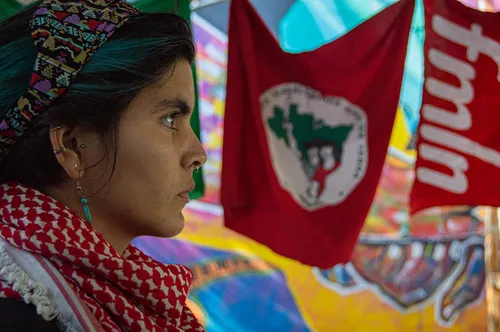
“The first thing we had to learn was to overcome defeat,” said Sandra Moran Reyés in a moving tone, as the auditorium erupted in applause. With her slow and strong voice, she speaks while standing in the middle of the stage.
Reyés is a prominent human rights activist and one of the founders of the collective that organized the first LGBTIQ pride march in Guatemala. She discusses her country’s political experience, whilst reflecting on the collective experience that spans the entire Latin American continent.
Under the title “Imperialist domination, war against life and hegemonic dispute”, the panel corresponds to the opening of the XV International Meeting on Emancipatory Paradigms, held in Havana in the last week of February.
The opening ceremony was dedicated to denouncing the genocide suffered by the Palestinian people in the Gaza Strip. On behalf of the more than 30,000 people killed, the testimony of a young Palestinian woman studying medicine in Cuba was read.
“I will not forget my mother’s message at the beginning of this tragedy, she told me: my daughter, I know that your circumstances are difficult, we are exposed to danger at any time and there is no safe place here. I recommend that you continue your studies and your dream for which he fought so hard. Resist and face it, lift up our name and the name of Palestine.”
Organized by the Cuban Institute of Philosophy and the Martin Luther King Memorial Center, the International Meeting of Emancipatory Paradigms is a meeting that takes place every two years with the intention of creating a space for social movements, activists, researchers, popular educators and students who fight against different forms of oppression meet and exchange knowledge.
Meetings bring together social movements, activists, researchers, popular educators and students who fight against different forms of oppression / Nieves Molina Fleites
Learning the hardest thing: listening
“The importance of this sincere, transparent meeting without double intentions is to get to know each other, come together and listen to each other. Without anyone putting one’s foot on the other. But listening to each other in a truly horizontal way”, says Javier Larrain, member of the magazine Correo del ALBA, for the Brazil in fact.
Critically, Larrain observes that, in the past, the left has often neglected agendas linked to environmental struggles, indigenous peoples, feminist struggles and gender diversity. The International Meetings on Emancipatory Paradigms have been spaces for dialogue between these different experiences.
“To get to know ourselves, listen to each other, reflect and chart routes towards a future that we do not know in organic terms. It will be a future based more on questions than on certainties. But, without a doubt, it will give us the answers to the we want,” he says.
The commitment to the collective construction of emancipatory knowledge has always accompanied the spirit of the meetings. Inspired by the concepts of popular education, the meetings were conceived as spaces that were not limited to a mere exchange of information, nor to a meeting in which all questions were already answered in advance. On the contrary, they were born as a space for exchanging knowledge and experiences, where the different lefts could develop links and meanings that contributed to political action and reflection through fraternal dialogue. In this way, the memory of the first meeting made clear the spirit that would mark the meetings: “the first clear and distinct idea of our workshops is the necessary collective construction of our own emancipatory paradigm”.
“These spaces allow us to see that there is something beyond what we identify as comfort zones”, explains Ania Torrero, Cuban feminist activist and journalist for the portal Cubadebateto the Brazil in fact.
“They allow us to team up, strategize, seek out colleagues, look for other ways of doing things. Experiment with what worked and what didn’t work, as others do, and, most of all, come together. To cozy up and recharge our batteries so that we can continue to wage battles.”

Showing that there are alternatives to the single thinking of the “Washington Consensus” is part of the origin of the meetings / Nieves Molina Fleites
A necessary collective construction
The first International Meeting on Emancipatory Paradigms was held in 1995. At that time, Cuba was going through what is known as a “special period”, one of the most dramatic and difficult moments in its history.
The collapse of the Soviet Union, its main political and commercial ally, in 1991 triggered an unprecedented economic crisis on the island. Cuba’s GDP suffered a contraction of 36%, which led to the dismantling of a large part of the material results that the Revolution had managed to build. Meanwhile, with the collapse of the system of countries that formed what was known as the socialist camp, Cuba was completely isolated from the world.
In this context, the United States emerged as the sole and undisputed international arbiter. The “Washington consensus” and neoliberal policies were imposed across the world: the triumph of capitalism as the only possible model seemed unstoppable.
The crisis, however, was not just political and economic. The emancipatory imaginary that had been articulated around the struggles of the working class, the processes of decolonization and the revolutions of the 20th century seemed to be in crisis. It was in this hostile and adverse context that the International Meetings of Emancipatory Paradigms were born.
“We thought of a way to meet again, to revive the spirit of the revolution, the spirit of hope and strength”, recalls Cuban philosopher Yohanka León del Río to Brazil in fact.
The first time Yohanka participated in the event was in 1997. Since then, she has always been involved in organizing the meetings. During all these years of collective efforts, the International Meetings of Emancipatory Paradigms brought together a wide variety of intellectuals, representatives of social organizations, artists and activists from different parts of the continent. They became a space for the collective construction of critical thinking.
Yohanka recalls that in those early years, when the meetings began, dominant academic and political discourses used to talk about the “end of utopias”, referring to the idea that there could no longer be anything outside of liberalism and capitalism.
“We began to come together to say that no, there is no end to utopias. There are many utopias. There are many emancipatory paradigms being built. Because there are people’s struggles and hopes, along with their resistance. Therefore, they did not kill utopia. The utopia of a humanized humanity is still alive”, she says.
In an adverse context, in which the extreme right is once again gaining ground, Yohanca emphasizes the importance of continuing to learn from the living experiences of people’s struggles.
“This right comes to take everything away, because the only world they conceive is a world for themselves. Therefore, it is a right with an expressed hatred for humanity. It is anti-humanism in the most explicit way. I think this is clear to the people. The meetings were born from the conviction that all experiences had something to teach and something to learn. Every educator, every activist, every peasant, every community has something to contribute to all of us”, he reflects.
Editing: Nicolau Soares

Source: www.brasildefato.com.br

